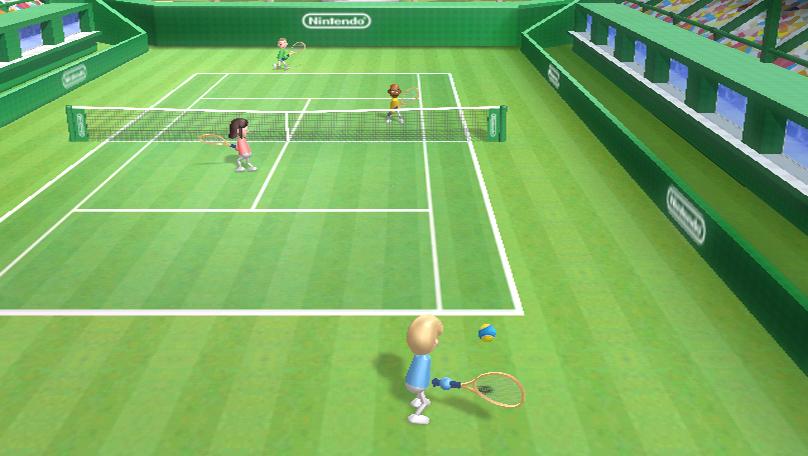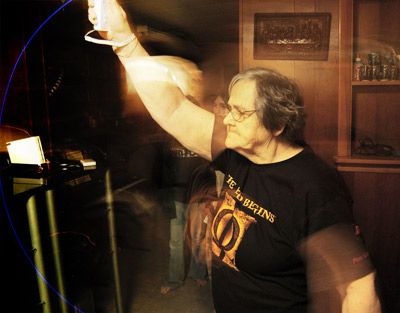
My grandfather is a stubborn man. He refuses to walk with a cane, though his eyes went bad a long time ago. He snorts at the idea of e-book readers, preferring a good newspaper any day. But most importantly, he has kept the same schedule for the better part of his retired life: wake up at six, take a short walk, snore on his easy chair, watch television, eat lunch, watch more television, eat dinner, take another walk, step in the shower, and finally go to bed at ten. This stays the same day after day, week after week, year after year– except on Thursdays, when he takes out the trash and recyclables before his walk, and except when it rains, when he complains to my grandmother that he can’t take a walk. There’s very little time in that rigid, if dull, schedule, for anything else. Or rather, there is time– he just won’t say so.
On one of my family’s trips back to Taiwan, I showed him my newly purchased Wii on his request (“Why is there a white box blocking the TV screen? Get it out of the way, now.”), and received my daily admonishment for wasting time and money on video games. This didn’t deter me, of course– The Legend of Zelda: Twilight Princess was worth being berated. But when my brother and I invited my cousin over to play our woefully underused Wii Sports game, I had a crazy idea.
“Hey,” I said. “Let’s get Grandpa to play.”

Ah, Wii Sports.The avenue of my grandfather-delivered buttkickin’.
My brother stared. I grinned back– though I knew just how crazy my idea was. My grandfather, a former policeman and a survivor of Mao Zedong’s bloody Cultural Revolution, playing video games? It’d go against everything he’d ever said about them. It was difficult to imagine him smiling, much less waggling a Wii Remote to swing a virtual baseball bat. Would Wii Sports really change his mind? Or was that too crazy? I had to try.
“Grandpa,” I said, holding out the Wii Remote tentatively. “D’you want to play tennis?”
The man stared at me. And– after allowing himself what seemed to be a rather vicious grin at the time (in retrospect, it was probably the face he made at criminals back in his policeman days)– he surprised all of us by nodding assent.
“Just tell me how to play,” said my grandfather, rising to the challenge. “And then let’s play bowling; I saw it on the screen there.”
You’ve probably heard this story before, of elderly people beating younger whippersnappers at games ranging from Wii Sports to The Conduit, but you have to remember, this was back in 2007, when the Wii had only been out for a few months. I had no idea that Nintendo’s schemes ranged this far, way beyond the cult of gamers the Nintendo GameCube, Sony PlayStation 2, and Microsoft Xbox had dominated just a year prior. The very idea of elderly gamers (or, let’s face it, anyone outside the “cult”) playing video games was almost anathema– though people like Old Grandma Hardcore existed, they were the exception to what I perceived as the rule. So you can imagine my sheer surprise when, donning the invisible garb of the pro gamer, my grandfather created a Mii that looked astonishingly like him (except his Mii was smiling– almost creepy) and used it to crush my brother and me in a Wii Sports tennis match.
“This is actually fun,” my apparently Olympic-level grandfather said as he proceeded to roll straight strikes in Bowling, much to my highly competitive brother’s chagrin. “Nothing like real bowling, though. I definitely wouldn’t play as well. But I might still beat you two kids, so don’t think too hard about it.”

Old Grandma Hardcore, showing up the general public with a high-flying Wii Remote.
According to BusinessWeek, the number of senior gamers is steadily growing. In 2005, 19% of gamers were over 50, up from 10% in 2000; one can only imagine what the numbers are like now, with the advent of Nintendo Wii and its more casually-oriented games. In fact, the senior gaming phenomenon– if one can even call it that, since it’s not so unusual anymore– has even been touted as beneficial, with a 2002 Harvard University report describing “significant increases in reaction time for gamers over 60”, with the University of Rochester procuring its own results describing how video games may improve vision. (This is, of course, despite what your mother tells you about how watching television will melt your eyeballs.) And of course there’s the physical benefits– even the U.S. military has used Wii Sports as therapy for wounded G.I.s. Add in the relatively cheap cost of gaming, compared to traditional pursuits like travel, and you’ve got a lifetime hobby. It’s really no phenomenon at all, then, that seniors fill the ranks of gamers just as steadily as other demographics do.
But if the numbers of senior gamers has been rising so much over the years, then so should confusion over the fact– after all, not many companies advertise their games to senior citizens, and even fewer discuss them in their games. Still, it’s probably not a good idea to point game development straight at senior citizens. BusinessWeek notes one proposal for a game described at the 2005 Game Developer’s Conference with cats in it– ostensibly because “all old ladies love cats.” I doubt my grandfather, or my grandmother for that matter, would play that game. In fact, I doubt anyone would, regardless of age. After all, nobody plays video games to be patted on the head by the game developer, squirming in a sea of condescension. The old may be old, but they don’t want to be insulted for it– and especially not in some chump’s video game.

Typical advert from Nintendo, prominently featuring senior citizens.
So what’s the best way to get the gray-haired gaming, if not games with little kitties rolling all over the place? It may have surprised me then, but in 2007, my grandfather played Wii Sports with us simply because it was easy– and at the same time, he could spend time with his grandkids, and hopefully teach them a thing or two in the process. Nintendo knows this, of course– it’s one of the few companies that really strives to make sure a senior, however Harrison Ford-esque, is in every Nintendo ad, playing along with a couple younger, too-handsome-to-be-true people. Really, for a gigantic company with ostensibly no feelings for its customers, save an intense love for their money, Nintendo’s done a good job in bringing the young and old together. (Even if that’s just what they want us to think.)
To do that, Nintendo– and other companies– had to make games simpler. What I mean by that isn’t that they had to dumb games down– rather, those companies had to make sure that people could actually understand what was happening on screen. Games like Cooking Mama Limited’s Cooking Mama or Nintendo’s New Super Mario Bros. Wii, both highly entertaining games for both young and old (and casual and hardcore), show that a game doesn’t have to be as complicated as the latest card-magic-gumball-weapon-based-JRPG to be fun. Moreover, they actually attract people with their simplicity, and unlike other games that try to do the same (see every other movie-licensed game on the market), they hold people’s attention just long enough for them to buy another game. A couple minutes with these pure games make gamers out of most anyone. Throw The Conduit at some random folks, though, and whether they’re five years old or fifty, it’s doubtful they’ll stick with video games for long.
People still wonder why so many older gamers are out there. To me, though, I think it’s pretty clear. What older gamers want isn’t some game directed at them– they just want the same thing as everyone else does. Like all gamers, they want games that they can understand, games that they know will be worth their time and, ultimately, games that they can share with other people. After all, there’s hardly a more social source of entertainment than video games– it gets people talking. Unless, of course, they’ve just been shocked into silence by the local retirement home handing their rears to them at Tatsunoko vs. Capcom: Clash of Superheroes.




 ShareThis
ShareThis







Your grandfather sounds badass. He should write an article some time :P